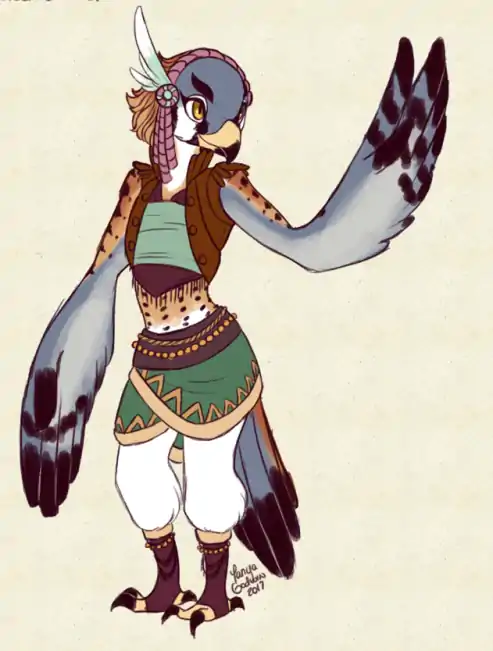Rito, Variant (5e Race)
| “ | Impressive, I know. Very few can achieve a mastery of the sky. | ” |
| —Revali, master archer and Rito champion | ||
Rito
The cool mountain breeze blows softly through the jagged cliffsides. In the high-altitude area of the world, several rocky pillars touch the sky. Attached to them are villages made up of cozy huts that endlessly spiral upwards. Here you will find the Rito, a free-spirited race living each of their lives to the fullest. As you enter the Rito Village, the alluring scent of a hearty Salmon Meunière fills your nostrils. As you stroll along the wooden floors and staircases, you hear the innkeeper talk of the famed Rito-down bed, the world-famous bed known for the comfort it brings to weary travelers that pass through the village. As you continue to ascend the stairs, the meticulous work of a Rito craftsman can be heard. Upon further investigation, you see that he is applying the finishing touches to a gorgeous-looking shortbow. You never thought that shortbows could be made with such precision and elegance. As you reach the top of the village, you have come across a square wooden platform with the Rito emblem etched onto the floor. You sigh and sit on the edge of the platform, allowing the calm breeze to gently swing your legs back and forth. As you watch the radiant orange glow of the sunset, you now know why the Rito Village is a very special place.
Physical Description
Rito are avian humanoids that resemble exotic birds of many different species. They are covered in a thick layer of colorful feathers that vary in hue from individual to individual. These feathers take on two colors that match each-other on the color wheel and are thick and layered, helping the Rito retain body heat in the cold climate they reside in. The feathers of the Rito are even said to be one of the softest materials found in the Material Plane.
Rather than having arms, much like a human does, the Rito have a long pair of wings with feathered appendages that resemble human fingers and thumbs, allowing them to grab and hold objects with their wings. The Rito also have long tail feathers that match the color of their other feathers. These tail feathers assist in aerial maneuvering and balance while a Rito flies. The colors of a Rito's feathers change to a darker tone when seen on the tips of their wings and tails. Their legs are covered in a thick skin and three bird-like toes mark the ends of their feet. Completing their avian appearance is a sharp-tipped beak on the front of their face.
History
Very little is known about the Rito's creation as a race. Many scholars theorize that they are the biological descendants of the Zora, a species of aquatic humanoids that are just as technologically advanced as the Rito. However, evidence of this connection has yet to be found in Hyrule, and therefore the theory is generally agreed-upon as debunked. In terms of their interaction with other races, they get along very well with all sentient creatures, forming particularly close alliances with the Hylians, Gorons, Zora, and Gerudo. Although the tradition of aerial combat has been passed down since the beginning of Rito civilization, the Rito generally do not participate in conflicts and mainly use shortbow marksmanship as a sport and contest between the best Rito archers. If provoked, however, the Rito are not afraid to take up arms to defend their villages in dire situations.
Among the Rito, there have been many famous individuals whose stories are told throughout Hyrule. A notable figure in Rito history is Kass, the most famous and celebrated bard in all of Hyrule. The ancient songs that he plays on his concertina were taught to him by a teacher shrouded in mystery. Many believe that his music is the key to unlocking hidden secrets behind prehistoric temples scattered throughout Hyrule. One cannot discuss significant figures in Rito history without mentioning Revali, champion of the Rito. As the self-proclaimed "most skilled archer of all the Rito", he was often interpreted as arrogant and prideful by those that weren't acquainted with him. Despite his arrogance, Revali had a compassionate side, always willing to protect his village and the Rito people. Wielding the first Great Eagle Bow ever created, he valiantly protected the Rito Village his entire life until his demise at the hands of an unstoppable darkness. Before his death, he not only perfected aerial combat but also mastered the art of creating updrafts with his wings, allowing him to soar into the sky at heights far exceeding others of his kind.
Society
Rito society is simple and easy to understand. It combines the Rito traditions of old with the structure of modern civilizations. Each Rito village is led by a village elder, an elderly and wise Rito elected by popular vote. They are tasked with maintaining the happiness and prosperity of the village and the Rito living there. They remain in power until they die or they are voted to be removed from their position. In both cases, the Rito population elects a new village elder to take their place. Next in the line of power are the members of the village guard. They're tasked with patrolling the village outskirts and acting as the village's defense force against intruders. Armed with Feathered Spears and Swallow Bows, they are skilled in combat and always keep those with evil intentions from getting anywhere near their village. Besides the elder and the village guard, there are no other positions of power in Rito society. Rito are encouraged to pursue a career that satisfies them and makes them happy, resulting in a vast array of businesses present in Rito villages, from inns to general stores and even armories. These stores bring economic blessings to Rito villages and also attract foreign customers of different races and nations.
One of the most important Rito traditions is the art of archery. All Rito are trained at birth to be skilled shortbow users, and this marksmanship is put to the test in a bi-annual archery competition held at the Flight Range, Revali's private training grounds where he perfected his combat techniques. It is a mountainous area where strong winds create updrafts that can allow Rito to gain altitude at staggering rates while flying. During these archery competitions, each Rito takes turns flying into the air and firing arrows at as many airborne targets as they can in three minutes. Precision, speed, and finesse are crucial to a Rito's success in this competition. Those who win are given gifts from the village elder and gain the reputation that comes from winning such a difficult and intense competition. Rito archery competitions draw a massive crowd and are famous for being some of the most fantastic spectacles in Hyrule.
Rito Names
The names of Rito follow a very specific pattern. Rito names only consist of a first name that contains at least one hard vowel. Additionally, their names usually have an extra vowel at the end of their name that is stressed when pronouncing it verbally. Although most Rito names follow this pattern, a handful of Rito have decided to deviate from this tradition.
Male: Fyson, Harth, Huck, Kaneli, Kass, Mazli, Nekk, Revali, Tulin, Teba, Verla
Female: Amali, Bedoli, Cecili, Genli, Laissa, Misa, Saki
 |
|---|
| A Female Rito. Source |
Rito Traits
Avian humanoids that combine their prowess in the air with their shortbow skills.
Ability Score Increase. Your Dexterity score increases by 2, and your Wisdom score increases by 1.
Age. Rito share the same lifespan as humans, maturing near the end of their teens and living no longer than a century.
Alignment. Rito value honor and loyalty and are true to their word. They also try to do the right thing when making moral decisions, making most Rito Lawful Good.
Size. Rito are much lighter and taller than humans, standing at an average of 7 feet and weighing around 90-120 lbs. Your size is Medium.
Speed. Your base walking speed is 20 feet. You have a flying speed of 50 feet.
Flight. Because your feathered arms double as wings, you have a flying speed of 50 feet. To use this speed, you can’t be wearing medium or heavy armor. While flying, you cannot wield more than one weapon, wield two-handed weapons, or wield weapons with the Heavy property. In addition, weapons with the Versatile property must be wielded in one hand while flying.
Avian Anatomy. Your race has evolved over time, giving you insulating feathers that cover your body. You’re acclimated to high altitude, including elevations above 20,000 feet. You’re also naturally adapted to cold climates, as described in chapter 5 of the Dungeon Master’s Guide.
Shortbow Expertise. For generations, the Rito have passed down the ancient art of aerial shortbow combat. As a result, you are extremely skilled with these weapons. You have proficiency in the shortbow and attacking at long range with one doesn't impose disadvantage on your ranged weapon attack rolls. In addition, you can wield a shortbow while flying.
Languages. You can speak, read, and write Common and Auran.
Random Height and Weight
| Base Height | Height Modifier* | Base Weight | Weight Modifier** |
|---|---|---|---|
| 7′ 0″ | +1d10 | 105 lb. | × 1 lb. |
|
*Height = base height + height modifier | |||
Back to Main Page → 5e Homebrew → Races

